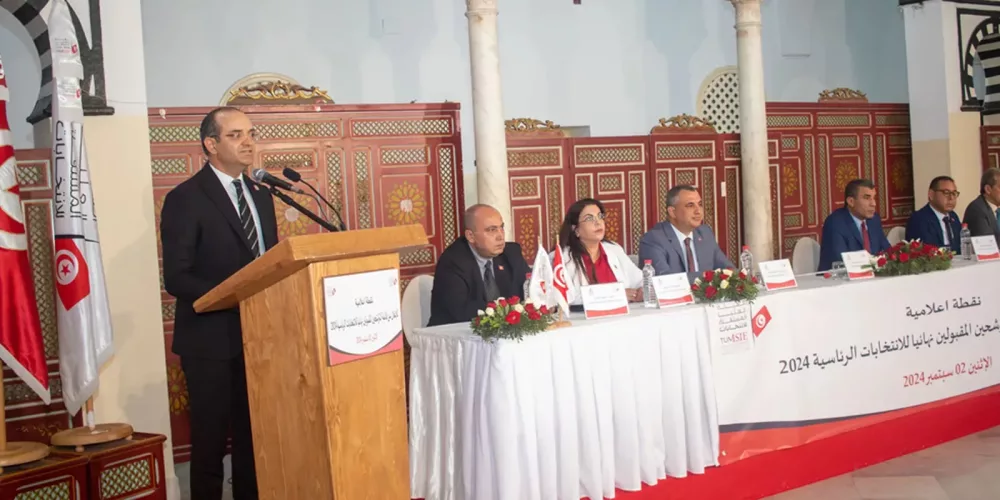The Committee for Justice (CFJ) stated that evasion and non-implementation of legal texts and judicial rulings form the backbone of authoritarian regimes and their institutions. These regimes rely on circumventing laws and interpreting them in a way that ensures absolute power remains in the hands of a ruling minority. This approach limits public freedoms, suppresses any attempts at reform or change from within the system, creates an environment of fear and dependency, and contributes to the perpetuation of tyranny and the erosion of trust between citizens and state institutions.
This statement was in response to the announcement by Farouk Bouasker, President of the Independent High Authority for Elections in Tunisia, on September 2, 2024, during the announcement of the final list of approved candidates for the presidential elections. Bouasker said, “It was impossible to review copies of the rulings recently issued by the judicial plenary session of the Administrative Court due to the lack of notification to the Electoral Commission in accordance with the law, within 48 hours of the pronouncement by the Administrative Court’s registrar, as per the explicit wording of the last paragraph of Article 47 of the Electoral Law, despite the official correspondence with the court requesting those rulings within the legal deadlines.”
Bouasker added that, based on this, the Electoral Commission decided, “after noting the impossibility of implementing the decisions recently announced by the Administrative Court, to consider the list of approved candidates, ratified by the Council during its meeting on August 10, 2024, as final and not subject to appeal, and to order its publication in the Official Gazette of the Republic of Tunisia, which includes the final approved candidates: Al-Ayashi Zammal, Zouhair Maghzaoui, and Kais Saied.”
Meanwhile, Faisal Bouqra, the official spokesperson for the Administrative Court, affirmed that the court sent a copy of the plenary session ruling to the commission within the legal deadlines, even before it was announced to the public, emphasizing that “failing to implement the rulings of this session is unprecedented,” as he put it.
The Administrative Court also stated in its communiqué issued on September 2, 2024, that it “consecutively and immediately upon the pronouncement of the rulings, delivered a certificate of the ruling to both parties to the dispute,” making it impossible to claim that the commission did not receive the text of the ruling as a pretext to avoid implementing it.
The recent decision by the Independent High Authority for Elections in Tunisia sparked widespread reactions within the country’s civil society. The Tunisian Judges’ Association expressed deep astonishment at the statement made by the commission’s president, linking the announcement of the names of the final approved candidates for the presidential elections with the review of the reasons behind the rulings issued by the plenary session.
The association emphasized that the decisions of the Administrative Court regarding electoral appeals are final and not subject to any form of appeal, even for cassation, while stressing that the Electoral Commission’s decisions are subject to the oversight of the Administrative Court. This is considered judicial oversight that guarantees the integrity of the electoral process and is entrusted with it, with the court having the final say in disputes over candidacies. These decisions are not subject to review by the Electoral Commission, which is only obligated to implement them, urging the commission to comply with the law and apply the Administrative Court’s rulings.
Tunisian judge and President of the Union of Administrative Judges, Rafqa Al-Mabarki, stated in a comment that the “commission’s manipulation of the constitution and the law to achieve a known goal and overturn the final judicial rulings is a blatant deception of public opinion. It’s a scandal in every sense of the word.” In a post on her Facebook page, Al-Mabarki questioned, “What impossibility are you talking about? The Administrative Court has notified you of the rulings, and this is sufficient by the explicit text of Article 47 of the Electoral Law.”
The Tunisian Journalists Syndicate also condemned the “commission’s exclusion of all media outlets from covering the press conference announcing the final list of candidates for the presidential elections, and its use of public facilities to serve this exclusionary agenda.” It considered that “the commission’s practices fall within the scope of exerting pressure and exploiting public television to serve its image, directing media coverage, and limiting the objectivity of the media and its role in enlightening public opinion and informing them about the background of the latest decision made by the commission.”
CFJ confirms that just as the Independent High Authority for Elections is responsible—according to the constitution and its basic law—for ensuring democratic, free, pluralistic, fair, and transparent elections, the Administrative Court is the judicial body responsible for overseeing every stage of the electoral process. It guarantees the rights of voters and candidates, ensures the legitimacy of the electoral process, and the credibility of elections, with its rulings issued on behalf of the people in its plenary session not subject to any form of appeal and must be implemented. No other body—regardless of its nature—has the authority to assess, question, or refuse to apply these rulings or to prioritize them.
CFJ also stresses that such unconsidered decisions issued by the Electoral Commission will contribute to plunging the country into legal chaos and pave the way for continued judicial conflict if the court rules to annul the commission’s decision, leading to a legally and constitutionally invalid presidential election.
Therefore, CFJ calls on the Independent High Authority for Elections in Tunisia to halt its latest decision, accept the rulings issued by the Administrative Court, reinstate the candidates who were excluded, and stop manipulating the law, the state, and its foundations in a clear attempt to hijack the will of the people, the sole sovereign authority.






